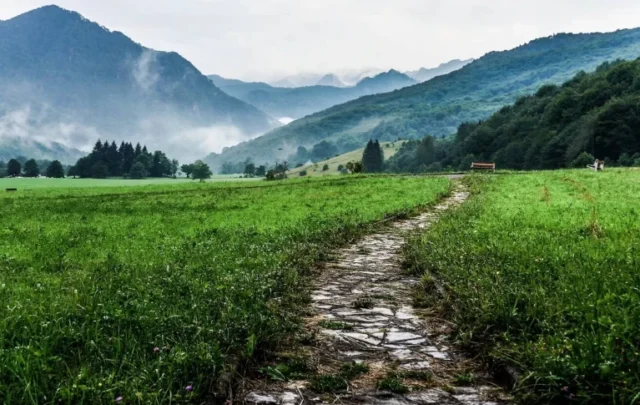 Modern societies like cultural diversity, preferably when it is far away, reasonably photogenic and does not inconvenience them politically. They also like to marginalize minority cultures and transform them either into folkloric caricatures or into assimilated ghosts of their former selves. During the last two centuries, modern civilization has absorbed most of Earth’s cultural diversity and is currently quite busy assimilating or destroying the rest while multiplying the subcultures in its midst. It is a typical case of replacing geographical cultural diversity by internal heterogeneity. It had to be expected from societies which had, until recently, accumulated an embarrassing surplus of cheap energy, but that is still a bad idea, and one which will become really problematic as our energetic surplus dries up.
Modern societies like cultural diversity, preferably when it is far away, reasonably photogenic and does not inconvenience them politically. They also like to marginalize minority cultures and transform them either into folkloric caricatures or into assimilated ghosts of their former selves. During the last two centuries, modern civilization has absorbed most of Earth’s cultural diversity and is currently quite busy assimilating or destroying the rest while multiplying the subcultures in its midst. It is a typical case of replacing geographical cultural diversity by internal heterogeneity. It had to be expected from societies which had, until recently, accumulated an embarrassing surplus of cheap energy, but that is still a bad idea, and one which will become really problematic as our energetic surplus dries up.
Contrary to what many people think we aren’t a fangless, clawless maladapted ape which only its intelligence saved from extinction. We are superb long distance runners and walkers. We are very good at throwing things at mobile targets – for instances sharpened sticks at antelopes. We have a very good cooling system which makes us very heat-tolerant and a remarkable eyesight which makes us highly effective predators in an open or semi-open environment.
We are tropical savanna animals, at home in steppes and prairies provided there are at least a few trees in them but ill at ease in dense forests, where a predator can strike without warning. It is not by chance that we wrestled the world from our competitors at a time when most of Eurasia was covered by cold steppes. The outcome would have been very different in a warmer, wetter climate.
It is obvious, however, that we don’t all live in tropical savannas. In fact, a significant part of the human population lives in ecosystems totally unsuited for our species such as swamps (where our cooling system kind of underperform) or tundras (remember, we are tropical animals). We have to some extend adapted our bodies to those new environments but this remains limited. People living in cold climates are lighter-skinned, not fur-covered.
In fact, humanity has a very low genetic diversity, to the point it could become a problem should a really nasty bug arise, and the diversity which matters (for instance the prevalence of haemochromatosis in north-western Europe) is most of the time totally unrelated to today’s ethnic and cultural realities.
During most of our history, we have adapted to new environments, or to changes in our environment, by developing new technologies or social devices. Thus, when the climate changed 12,000 years ago and the herds which kept our paleolithic ancestors fed and clothed retreated northward, the tribes of Western Europe adopted the bow, a weaker but more accurate weapon than the spear-thrower, to hunt in the dense forests which soon came to cover Europe. Their cousins in the middle-east gathered around fields of wild cereals, changing their social structure to adapt to their new situation.
This is by now way a foolproof process. The native population of Kangaroo Island, or, more recently, the Greenland Vikings failed to adapt to a changing environment and went extinct, as did the first inhabitants of Palau.
Developing and maintaining a technology or a set of customs is costly and in small populations even basic technologies can be lost. The natives of Sentinel Island, for instance, no longer know how to make fire and the Mesolithic tribes of Western Europe quickly discarded the spear-thrower when reindeer were replaced by more elusive deer and roes.
Indeed, human groups tend to discard technologies they no longer need. After the late bronze age collapse, for instance, the highly organized Mycennian kingdoms were destroyed and replaced by a collection of independent villages too poor and too small to need a bureaucracy. The royal scribes became peasants and writing was forgotten in a mere generation.
The result has been a specialization of human groups, a trend reinforced by linguistic and cultural drift – inevitable in a low-tech environment – but also by our tendency, as social animals, to build our collective identity around cultural markers. Of course mergers, more or less voluntary, happen as does cultural diffusion but even a cursory look at a linguistic map of pre-industrial Europe or of pre-contact America will show that their effects have been temporary at best.
A wave of newcomers could unify culturally a large areas, as the Indo-Europeans did in Europe, the Bantus in Africa and the Pama–Nyungan in Australia, but they will soon fall to the combined forces of specialization and cultural fragmentation.
The advent of cheap and plentiful energy changed the rules of the game, however. Long distance conquest and tribute extraction are probably as old as empires, and in no way a Western specialty. Imposing one’s culture in an ecosystem to which it was not suited was quite another matter. European invaders could conquer the precolombian American states, which, by definition, were located in areas suited to agriculture. They could colonize the eastern seaboard which has roughly the same climate as Western Europe. Permanently occupying the rain forests, the deserts or the pampa was far more problematic. Those areas remained under effective Indian control until very late in the game. It was even worst (or better, depending from your point of view) in Africa where diseases played against us.
Fossil fuels, however, enabled us to fit the environment to our culture rather than the other way around. This is not an uncommon occurrence in nature and something very similar happens every time we flood a meadow with manure. This sudden glut of nutrients favors fast-growing weedy species which will soon smother out more efficient but less profligate plants, leaving very verdant but quite monotonous grass meadows. A similar process has been happening all over the world since the beginning of the industrial age, causing growth-oriented variants of European and East-Asian cultures to spread to areas where, in normal times, they could not have thrived. It also has caused the rise of a global meta-culture characterized by a common faith in progress.
The other, more specialized cultures, survive only in margins and should industrialism have proved sustainable, they would have had to choose between dying out and becoming a mere variant of the the global culture.
We know, however, that industrialism is not sustainable. Earth’s innards holds only so much recoverable fossil fuels and we have already extracted the best part of it. Production of crude oil has plateaued and it is only a matter of time before other fossil fuels follow suit. Ultimately our civilization will be left with only what wind sun and water can provide. While this does not mean that all our technologies will become unsustainable, our current strategy of adapting our environment to ourselves clearly will.
Add to this that the environment itself is likely to drastically change thanks to our deplorable habit of dumping truckloads of CO2 into the atmosphere, and it becomes quite obvious that cultural diversity will come back with a vengeance. Western – and East-Asian culture will have to retreat from areas unsuited to their preferred lifestyle, or change so much in the process that it will amount to the same. The poster child for this will probably be American desert cities such as Phoenix or Las Vegas, but northern China or the Southern Spain are prime candidates for such an evolution too. Whoever will inhabit those areas two centuries from now will have to adopt the same lifestyle as preindustrial desert tribes.
The problem is that those who have kept the technologies, both social and material, needed to thrive in ecosystem hostile to European or East-Asian style agriculture are likely to be early casualties. Even when they still form viable cultural units, they are too specialized to survive intact the effect of global warming. Besides, they are militarily extremely weak and would be destroyed without the protection of modern nation states – even the Sentinelese, who have made an habit of shooting down everybody sailing too close to their island will be soon overrun when Indian policemen will stop protecting them.
This means that we will have to rebuild a cultural diversity anew by acquiring skills and social habits adapted to ecosystems which do not yet exist at the exact moment the few people who still master those skills are on the verge of cultural extinction. Moreover, those people won’t profit in any way from our collapse for the world we will left will be different enough that , to survive, they will have to completely reconfigure their culture. The Inuits, for instance, may still exist two centuries from now, especially in Greenland, but they will be more likely to raise cattle than to hunt seals, they will have horses, not sled dogs and the place of snow and ice in their culture will have been seriously reduced.
Even so, rebuilding cultural diversity is by no mean an impossible task. As a species we are very good at borrowing technologies and cultural features from our neighbors and calling them our own. Here in Brittany we eat a very typical buckwheat pancake called “galette”, yet buckwheat is a Chinese, which was never cultivated in Western Europe before the XIVth century.
In fact, the internal diversity of our own society, doomed as it is, can be an asset in that matter. While I fail to see the point of most of our subcultures, their sheer number means that there always will be someone to document or perpetuate the technological and societal skills of some half-forgotten tribe. Whether it will be enough, however, is quite another matter as it means preserving a knowledge which will be quite irrelevant to our everyday life until quite late in the game. This implies a serious amount of geekery and self-marginalization and definitely won’t get you money or influence.
A bit like copying Latin books in Dark Age Britain.





